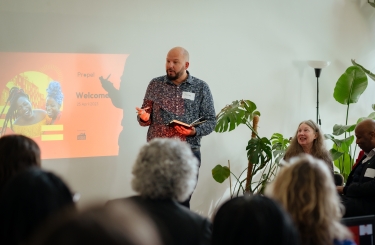What Is Risk Anyway?
At The Social Change Nest, we act as fiscal hosts for grassroots groups. This means we take on the risk on behalf of funders, and advise funders on how to get their money safely and transparently into the hands of the people that need it most.
So you could say we’re in the business of risk management. Which means we think about risk A LOT and we’re constantly asking: What do we actually mean when we talk about risk?
It’s tricky, because risk is a feeling. It’s subjective. It can be arbitrary and it’s often abstract.
Who Runs The World? Risk
In an ideal world, our approach to dealing with risk would be:
- Proportionate - the steps we take to mitigate the risk are proportionate to the risk presented.
- Contextual - the views of those most affected by a decision on risk are adequately considered.
- Fluid - we are able to adapt our approach to risk. Risk is influenced by so many different factors, and our collective understanding of what is risky can change in a short space of time. Our approach to it should be able to evolve too.
And yet, the way we deal with risk in the nonprofit sector is too often the opposite. Since we set up in 2020, we’ve heard many stories of groups having to complete 6+ page applications and adhere to stringent reporting requirements for grants under £1,000. Some have tried to access funding and have been deemed ‘too risky’ by grant committees, and others have felt the need to register as incorporated charities to have a better chance of getting funding, creating unnecessary administrative and financial burdens.
I can guarantee that many risk frameworks are set up and managed in a centralised way that doesn’t invite much opportunity for contextualisation. And how often do we hear about frameworks evolving in a way that responds to our changing reality? In fact, through my many conversations with colleagues in the sector, it’s clear that many processes exist ‘just because that’s how it’s always been done’.
Unfortunately, this means we’ve managed to weaponise risk and create frameworks that are exclusive and extractive.
How often do we hear about frameworks evolving in a way that responds to our changing reality?
Is It Risky? Yes. Should We Still Do It? Yes
So, what happens if we don’t use the word risk? At an event we held in 2022 called ‘Risky Business’ we brought together funders and changemakers to talk about just that. One of the participants suggested we ask ‘What are you scared of?’ instead – a question that’s harder to answer with jargon. As my colleague Anya argues, if we moved away from formalised language around risk, would the people most affected find it easier to have an authentic voice in spaces where funding decisions are made?
Maybe we need to stop talking about risk. Or maybe, we simply need to stop being so scared of it. At The Social Change Nest, we acknowledge risk and try to address it. We have conversations with the groups and projects we support. Of course, we have default frameworks and processes, but we understand the business of risk is never a one-size-fits-all. The questions we typically ask are:
- Who would be affected in the different scenarios? [Who’s at risk?]
- How would they be affected? [What’s their risk?]
- How likely are they to be affected? [How likely is the risk?]
- What can we do to minimise that outcome? [How can we mitigate the risk?]
Two things to note:
- The first question should help contextualise the risk. It encourages us to consider different perspectives and bring people into the conversation. It also means we consider the risks of all scenarios, i.e. what is the risk of NOT funding the group?
- The final question is absolutely key. One of the many reasons why I love working at The Social Change Nest is because instead of saying: Is it risky? Yes >> Then let’s not do it. Our conversations are: Is it risky? Yes >> Then how can we do it? How can we manage the risk?
It takes a mindset shift. It takes a team committed to the cause. And it takes a lot of time. We’re ready for a new culture on risk. Are you?


